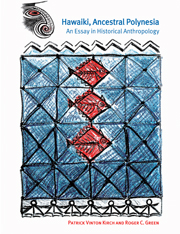Book contents
- Frontmatter
- Contents
- List of figures
- List of tables
- Preface
- List of language abbreviations
- Prologue: on historical anthropology
- Part I The phylogenetic model: theory and method
- Part II Rediscovering Hawaiki
- Epilogue: on history, phylogeny, and evolution
- Notes
- Glossary of terms
- References
- Subject Index
- Index of Proto Polynesian Reconstructions
Prologue: on historical anthropology
Published online by Cambridge University Press: 06 January 2010
- Frontmatter
- Contents
- List of figures
- List of tables
- Preface
- List of language abbreviations
- Prologue: on historical anthropology
- Part I The phylogenetic model: theory and method
- Part II Rediscovering Hawaiki
- Epilogue: on history, phylogeny, and evolution
- Notes
- Glossary of terms
- References
- Subject Index
- Index of Proto Polynesian Reconstructions
Summary
Our problem may be metaphorically defined as the translation of a two-dimensional photographic picture of reality into the three-dimensional picture which lies back of it… The gaining of an historical perspective will mean the arrangement in as orderly temporal sequence as possible, within as definitely circumscribed absolute time limits as circumstances will allow, of the processes studied by our science, the carriers of these processes being generally defined more inclusively than in documentary history.
sapir 1916:2Polynesians called it Hawaiki (or sometimes, Kahiki, or Pulotu), the distantly remembered homeland, source of their ancestors, mythical site of the creation of culture, and spirit realm to which their own souls would voyage after death. They honored this ancestral homeland in chant and song, and named newly found islands after it: Savai‘i in Samoa, and the large island of Hawai‘i, among them. But was there ever in reality such a “Hawaiki,” or does it exist only in the shadowy realms of cosmogonic myth? Archaeologists, after a half-century of intensive pursuit of the question of Polynesian origins, would answer affirmatively. More precisely, they would fix the coordinates of this ancestral homeland in time and space: the archipelagos of Tonga and Samoa (with their immediate smaller neighbors), in the first millennium BC. Through an unbroken sequence of cultural change that begins with the arrival of small groups of Early Eastern Lapita peoples around 1100–1000 BC, a distinctive Ancestral Polynesian culture had developed four to five centuries later.
- Type
- Chapter
- Information
- Hawaiki, Ancestral PolynesiaAn Essay in Historical Anthropology, pp. 1 - 10Publisher: Cambridge University PressPrint publication year: 2001



